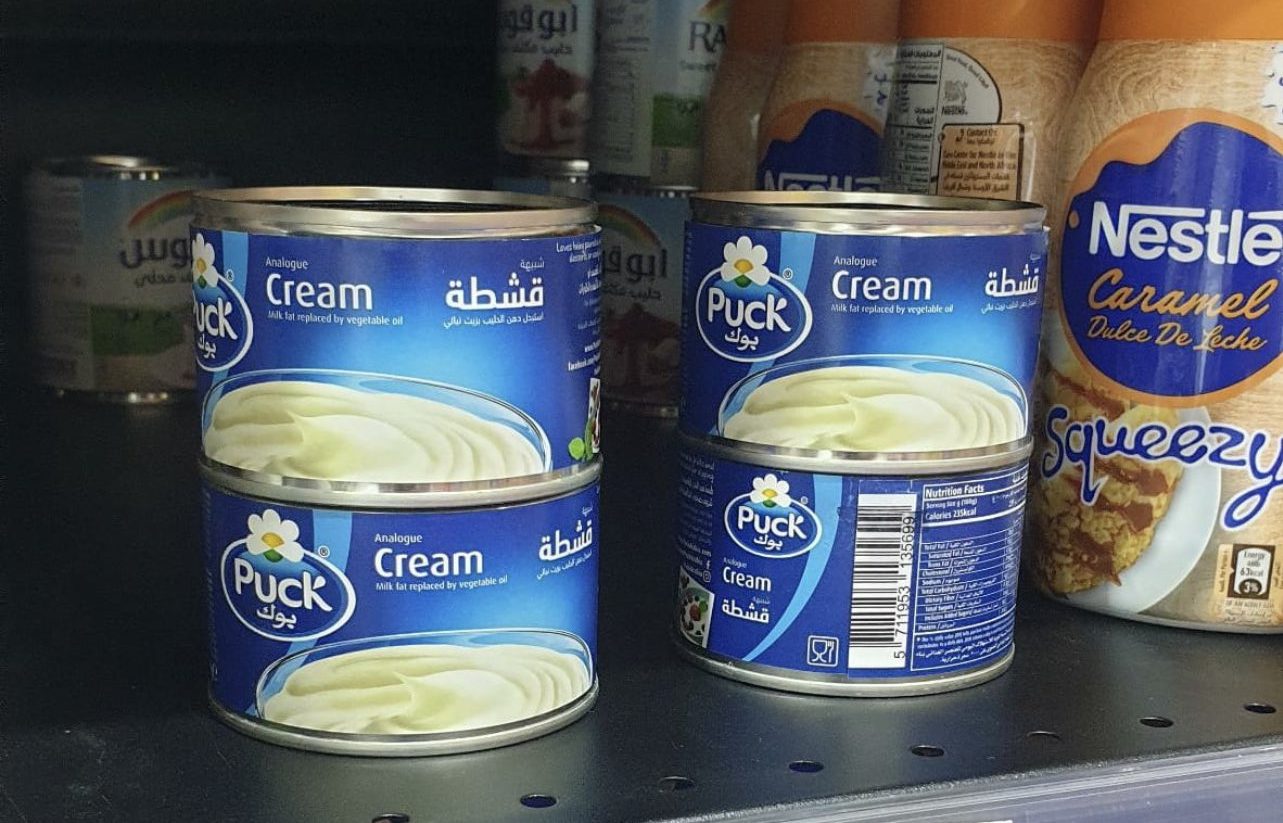A similar debate erupted on social media in 2021 when users called for preserving brand diversity under the hashtag #SaveCheeseFromMonopoly.
Concerns over an alleged “cream shortage” at supermarkets in Qatar have been shared among local social media users online, with reports of resellers spiking up prices.
Social media users have pointed to what they described as a lack of diverse options of canned cream from local supermarkets since late last month, comparing the market to neighbouring GCC nations.
“In Mecca there are eight different brands,” a Qatari social media user said in a tweet, with an image of stacks of the dairy product.
Another user claimed they saw resellers sell the product for extortionate prices online.
“How do you know that there is really a crisis in obtaining cream, and a market scarcity of the product? When Instagram merchants start selling a single box for 15 riyals? We don’t know why the product disappeared however what we do know is that there are hidden hands behind it,” the user claimed.
Another social media user said he saw few cans left at a store that he claimed once boasted a larger quantity.
“Yesterday, one of the online marketers announced that there was a quantity of canned cream in one of the malls, so I left my house and went to it. When I arrived, this was only the remaining amount!” he said.
However, the same social media user claimed he witnessed a similar shortage last Ramadan, in which more people purchase the product.
The online debate brought back a similar discussion that occurred back in 2021, in which social media users complained about monopoly in the local food industry after the “disappearance” of cream cheese.
At the time, consumers called for preserving brand diversity under the hashtag #SaveCheeseFromMonopoly.
While some have joked about the latest complaints, others pointed to what they described as a “bigger issue” that is similar to the “cheese monopoly”.
The latter accused businesses of removing other brands for a period of time to promote locally produced products. The more known brands are then allegedly returned to the shelves though at a higher price.
One person tweeted,”It is not the first time they have done this move. They contribute to raising inflation and increasing prices in the country!”
“The issue is not the matter of a carton of cream. The issue is the monopoly and disappearance of products, and returning them at double their value, and the matter was repeated more than once,” another Twitter user claimed.
Echoing similar sentiments, one person noted: “The problem is not in the disappearance of the cream, the problem is the way in which they disappeared!”
Residents of Qatar have since also called on the Ministry of Industry and Commerce (MOIC) to take action in order to address the issue, claiming that other products have disappeared from supermarkets, such as Crystal hot sauce.
“The issue is not the issue of a single commodity[…]the issue is monopoly itself, until when is it [going to continue]? Where is the role of the Ministry of Commerce with these problems?”
Local brands have dominated Qatari supermarkets since the 2017 Gulf Cooperation crisis. At the time, neighbouring Gulf countries and Egypt imposed an illegal air, land, and sea blockade on Qatar.
At the time, the sudden move disrupted food security in Qatar, which heavily relied on imported goods for more than 80% of its food needs.
While local support for companies grew with increased nationalism and a greater sense of defiance during the blockade years, there has been a demand for diversifying products to provide more options for consumers.
Seeking to support the domestic economy, the Qatari government has since created institutions to protect national products including setting up the National Product Competitiveness Support Department at the Ministry of Commerce and Industry.







